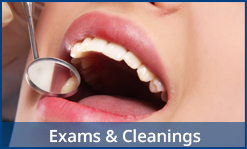If your child is in the process of getting baby teeth or losing them and beginning to get adult teeth, there is some important information to keep in mind regarding baby teeth. From a dental perspective, baby teeth serve as a transition. Although they perform the same function, baby teeth are only meant to last for a few years, until the child is old enough for his or her adult teeth to begin to erupt. In the meantime, keep in mind these facts about baby teeth so that you and your child will know what to expect.
- Most little ones will begin getting their baby teeth at about the age of one, although the exact age varies from one child to the next. Most experienced parents are all too familiar with teething babies. As it turns out, baby teeth are much more painful coming in than they are going out. If your toddler is teething, you can try massaging his or her gums gently with a little moistened gauze or try cooling down the gum tissue by giving your little one a baby bottle full of cold water.
- Take your toddler in for his or her first visit to the dentist around the same time as the first baby tooth erupts. The earlier you start, the more accustomed to the dental chair your child will become. Your dentist can also show you the proper way to clean your toddler’s gums and baby teeth.
- Baby teeth are usually somewhat more yellow than adult teeth. Don’t worry — this is normal. Just focus on keeping your child’s teeth and gums as clean as possible by gentle brushing with a dab of baby-approved toothpaste and a very soft-bristled toothbrush. Remember that teeth whitening products are NOT recommended for young children with baby teeth.
- The process of getting adult teeth usually starts sometime around the age of 6. The baby teeth will start to fall out, one by one and very gradually, over a period of a few years. Unlike the discomfort involved in getting baby teeth, losing them is usually not very painful at all. Baby teeth typically fall out in the order in which they came in, so the first baby tooth that your little one got will be the first one to fall out. It may take some time for baby teeth to fall out, so if your child notices that a tooth is loose, it may take as long as a few months for that tooth to fall out, depending on how much your child wiggles the tooth. After the tooth falls out, have your child swish a little warm water around inside his or her mouth, which should stop any minor bleeding that takes place. The replacement adult tooth should come in within six months after the baby tooth falls out. Most children go through this process of losing baby teeth and getting adult teeth between the ages of about 6 to 13.
From the time your little one is old enough to understand, you should start teaching and demonstrating good oral hygiene habits by helping him or her to brush twice a day and floss at least once a day. Those good habits, along with regular trips to the dentist, will ensure that your child enjoys a lifetime of good oral health.











